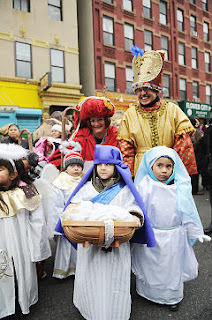
EPIPHANY, THREE KINGS DAY, LITTLE CHRISTMAS, WHY CHRISTIANS CELEBRATE IT??
Epiphany (from the Greek word meaning "appearance" or "to appear") is a Christian festival celebrated January 6th, 12 days after Christmas. Epiphany, often called Little Christmas, commemorates the appearance of Jesus to the Wisemen of the East.
We often use the word "epiphany" to refer to a revelation or recognition of importance in our lives. Epiphany, in the liturgical sense, is a feast day celebrated mostly in the Catholic and Orthodox faiths. Epiphany is the day Christians remember the visit of the Magi to the stable in Bethlehem. In the eastern or Orthodox rites of the Church, Epiphany is also he day which we remember the baptism of Jesus by John the Baptist in the Jordan river. When John baptized Jesus, he also proclaimed Jesus as the Messiah, the Son of God. He said, "Behold, the Lamb of God who takes away the sins of the world"
There are some who suggest Epiphany was originally established in order to commemorate the appearance of the celestial phenomenon heralding the birth of the Messiah. Still others maintain Epiphany is best remembered as the celebration of the manifestation of God's Son to the Gentile world. Yet, this would hold with the typical understanding of Epiphany as the day to celebrate the adoration of the Magi-Gentiles all, or so it seems.
As the Magi presented gifts to the Holy Child, many countries in southern and eastern Europe and also in areas of Latin America celebrate Epiphany, as the gift-giving holiday. Although Epiphany is a major feast day in the Christmas season, it receives almost no recognition in many western countries. The average American has never even heard of the feast of Epiphany.
 |
| Jesus being baptised by John the Baptist |
Early church fathers, Jerome and Chysostom recommended Epiphany as the day on which Jesus was baptized by John the Baptist and when Yahweh's (God's) voice was heard from heaven declaring, "this is my beloved son in whom I am well pleased"(Mathew 3:17). The Greek Fathers (church leaders following the Apostles in the first and second century) understood the Epiphany as the appearance of Christ to the world in the sense that Paul intends when he says "God's purpose and grace were made manifest now through the manifestation of our Savior Jesus Christ, who indeed did abolish death, and did enlighten life and immortality through the good news" (2nd Timothy 1:10).
 |
| Peruvian Three Kings Day |
Mary and Joseph had traveled to Bethlehem for the census where of course, Jesus was born. But according to Jewish law, they needed to wait until the eighth day after the birth of Emmanuel or Jesus. On the eighth day, a Hebrew male child is taken to the temple and presented for circumcision and the mother has her ritual purification. We refer to this eight day period as the Octave of Christmas and the whole of the Christmas season as Christmastide.
During this time, the first Slaughter of the Holy Innocents (Liturgical year: December 28th) by King Herod, occurred. Herod had heard rumors of a "new king" that was born. He ordered all male children under two killed in an effort to rid the area of the rumored king and potential threat to his throne. Mary and Joseph were preparing to leave, having been warned in dreams of the immanent danger. It was then that the Wisemen arrived and located the place where Jesus was. They encouraged Mary and Joseph to flee to Egypt for safety from Herod's soldiers.




No comments:
Post a Comment